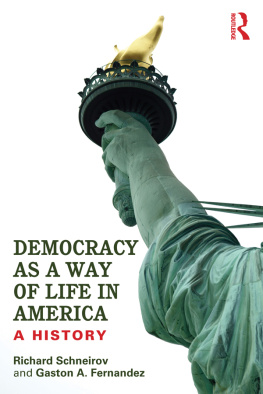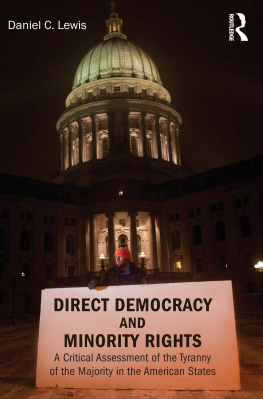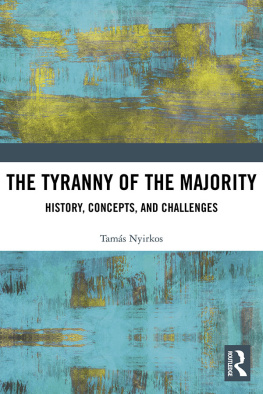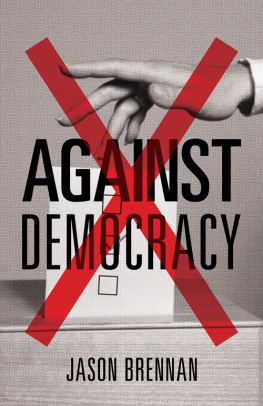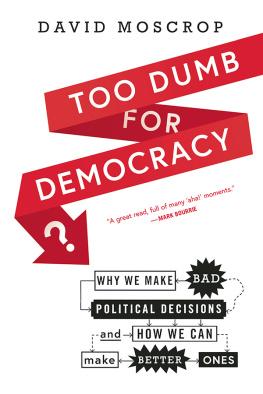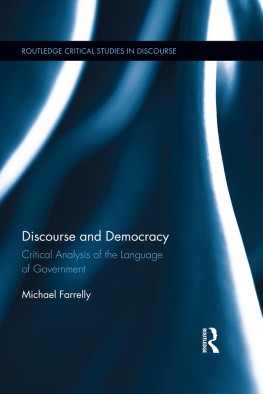

Copyright 2014 by David Harsanyi
All rights reserved. No part of this publication may be reproduced or transmitted in any form or by any means electronic or mechanical, including photocopy, recording, or any information storage and retrieval system now known or to be invented, without permission in writing from the publisher, except by a reviewer who wishes to quote brief passages in connection with a review written for inclusion in a magazine, newspaper, website, or broadcast.
First ebook edition 2014
eISBN 978-1-62157-227-5
The Library of Congress has cataloged the hardcover edition as follows:
Published in the United States by
Regnery Publishing, Inc.
One Massachusetts Avenue NW
Washington, DC 20001
www.Regnery.com
10 9 8 7 6 5 4 3 2 1
Books are available in quantity for promotional or premium use. Write to Director of Special Sales, Regnery Publishing, Inc., One Massachusetts Avenue NW, Washington, DC 20001, for information on discounts and terms, or call (202) 216-0600.
Distributed to the trade by
Perseus Distribution
250 West 57th Street
New York, NY 10107
For Leah and Adira
CONTENTS
Democracy: a government of the masses. Authority derived through mass meeting or any other form of direct expression.
Results, in mobocracy. Attitude toward property is communistic negating property rights. Attitude toward law is that the will of a majority shall regulate, whether it is based upon deliberation or governed by passion, prejudice, and impulse, without restraint or regard to consequences. Result is demogogism, license, agitation, discontent, anarchy.
U.S. ARMY OFFICIAL TRAINING MANUAL NO. 2000-25 (19281932)
Ill keep that in mind, Mr. Bailey, when this becomes a democracy.
STAR TREK (THE CORBOMITE MANEUVER, 1966)
On its world, the people are people. The leaders are lizards.
The people hate the lizards and the lizards rule the people.
Odd, said Arthur, I thought you said it was a democracy.
I did, said Ford. It is.
So, said Arthur, hoping he wasnt sounding ridiculously obtuse, why dont the people get rid of the lizards?
It honestly doesnt occur to them, said Ford. Theyve all got the vote, so they all pretty much assume that the government theyve voted in more or less approximates to the government they want.
You mean they actually vote for the lizards?
Oh yes, said Ford with a shrug, of course.
But, said Arthur, going for the big one again, why?
Because if they didnt vote for a lizard, said Ford, the wrong lizard might get in.
DOUGLAS ADAMS, SO LONG, AND THANKS FOR ALL THE FISH
I f youre going to write a book critical of one of the most admired ideas ever concocted by mankind, its probably important that you appropriately define the subject matter. So, for the most concise description of this books target, I turn to the popular user-generated, hyper-democratized online encyclopedia Wikipediaa place where consensus typically decides truth.
Democracy, according to the masses at Wikipedia, is a form of government in which all eligible citizens have an equal say in the decisions that affect their lives. Democracy allows eligible citizens to participate equallyeither directly or through elected representativesin the proposal, development, and creation of laws. It encompasses social, economic and cultural conditions that enable the free and equal practice of political self-determination.
This is more or less the standard portrayal of democracy, one that most Americans (at least those who spend much time pondering these sorts of issues) would accept as true. And, as this book will contend, half of this definition is unqualified gibberish and the other half, while true, is a decidedly dangerous truth. For starters, democracy, as embedded in our national consciousness, functions under an array of fictions.
No, democracy is not interchangeable or synonymous with the ideas of freedom or liberalism.
No, majoritarian rule is not inherently more moral, or more useful, or more virtuous than the decisions of one person or of a minority.
No, democracy does not give us equal say in the decisions that affect our lives, as Wikipedia would have it. The more democracy grows, the less say we have, actually.
No, the opposite of democracy is not tyranny; in fact, as Americas Founders knew, democracy itself can be tyrannical, which is why the Constitution has safeguards against it at every turn.
No, democracy doesnt always temper extremism (it can fan it) or create transparency.
Democracy doesnt preserve or expand cultural or intellectual diversity, as its very purpose is to run the state on widespread conformity.
Democracy isnt a counterweight to the concentrated powers of the elites. As the Greeks knew, democracies are prey to demagogues. Elites routinely manipulate democracies, because its not hard to manipulate a crowd.
No, democracy doesnt create economic and cultural freedom; its more often the other way around.
Actually, democracy is, by any reasonable standard, the most overrated, overused, overvalued, and misunderstood idea in political life. We have way too much of it. We think way too much of it. These days, an honest observer of Washington politics must concede that democracy has made our government irrational, invasive, and irresponsible. It has offered the American people two methods of governance: majoritarian domination or complete dysfunction (though many in Washington confuse healthy gridlock and unhealthy dysfunction). It deals in corrupt incentives, encourages a mob mentality, and in the process undermines the virtues that sustain a healthy republic. It has left a large traditionalist minoritythose most wedded to Americas founding, constitutional idealsdispirited, as they see their country apparently hijacked by a new revolutionary majority that believes in the power of the people rather than constitutional restraint and gradualist reform. It has put all fifty states, once marginally independent, at the mercy of an ever-growing centralized government in Washington, resting on national majority rule that dictates everything from healthcare policy to education policy. And when a national majority, through the power of the federal government, can overrule majorities in the several states or in localities, it is no wonder that many people feel powerless, because national majoritarian decisions cannot take into account endlessly varied local conditions, contexts, and information. Rarely can they take into account subtle, sophisticated, and substantive arguments. So, in turn, national democracy encourages us to be lazy, to do less thinking, to accept bumper sticker slogans as policy, to be less individualistic and less educated about the world around us, and it encourages others to take advantage of our lethargy; it allows the most powerful to abuse that power.
Next page


